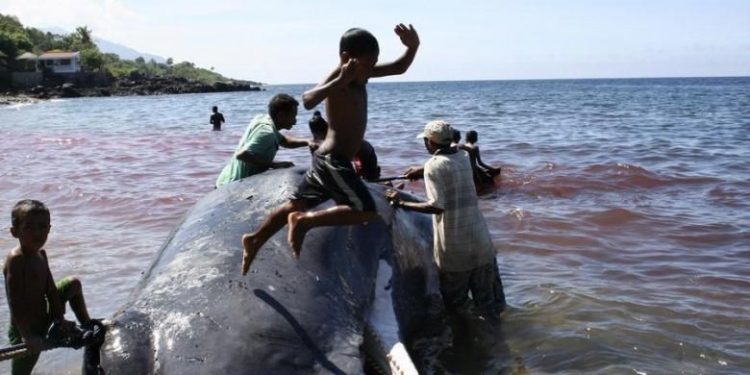Fishermen from the small whaling village of Lamalera, on a sunbaked island in remote eastern Indonesia, have been hunting whales for centuries.
They still do, now with permission from the Indonesian government, as long as it is for their own consumption and not for commercial sale. They may also hunt dolphins and mantas for their own use.
But as the government cuts down on illegal fishing in the Savu Sea, trying to conserve a critical migratory route for whale and dolphin species, conservationists are calling for a strict regulation of Lamaleran hunting practices, too.
“This is not basic needs. This is really beyond that,” said Glaudy Perdanahardja, an official with The Nature Conservancy, which is based in the United States but has an office in Indonesia that focuses on the Savu Sea. He suggested that islanders were no longer hunting merely for subsistence, but also for commercial purposes.
Although the group acknowledges the importance of whaling to the community, it worries that the introduction of motorboats to Lamalera more than a decade ago has led to the killing of more marine life.
Nowadays, Lamalerans use motorboats to hunt dolphins, mantas, and pilot whales, rather than traditional sailboats. While they still use sailboats to harpoon sperm whales, they sometimes use motorboats to tow the sailboats to the whales to speed up the chase.
But Lamalerans bristle at efforts by outsiders to regulate their fishing practices.
“The sea is our mother,” said Aloisius Gnneser Tapoona, 63, a grizzled harpooner who said he had killed around 80 sperm whales in four decades of hunting.
“Those who would restrict our access to the sea are those who would kill our mother.”
“Villagers of Lamalera are born from the whale,” continued Mr. Tapoona, whose house is decorated with trophies from the whales he has harpooned.
Their bones are displayed in a sculpture garden at the front of his yard.
“I always tell my child, ‘Your bones are from the whale. Your blood is from the whale. Your flesh is from the whale.’”
Mr. Tapoona estimated that Lamalerans catch around 20 sperm whales a year along with uncountable numbers of smaller pilot whales, dolphins, and mantas.
The village’s hard and rocky soil makes growing crops impossible, so villagers have no choice but to take full advantage of what the sea provides, he said.
Still, there are signs that Lamalera’s fishermen are trafficking in wildlife parts, which villagers say is related to changing economic times.
Over the last decade, cash has become an inescapable part of village life, as the barter economy fades. A local credit union opened in town a few years ago, offering loans for villagers to pay for modern needs like motor oil and their children’s education.
Over cigarettes and tuak, a foamy alcoholic drink made from palm fruit, fishermen confessed that loans had become a problem. A few bad catches, they said, and they could fall behind on their payments and slide deeper into debt.
In July, Indonesia’s police announced that they had intercepted a shipment of whale bones being trafficked between Lamalera and Poland. Last November, Gregorius Dengekae Krova, 61, a Lamalera fisherman, was arrested by Indonesia’s wildlife police after collecting manta fins for a presumed sale.



